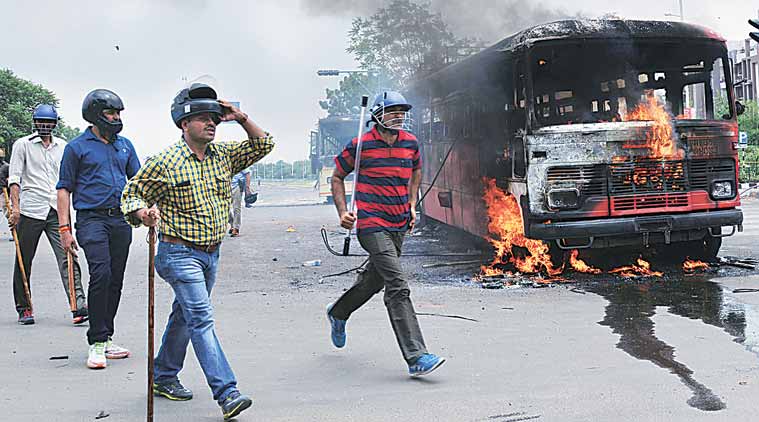Gujarat In A Melting Pot: “Towards ‘Inhalation’ or ‘Annihilation’ of Caste?
By K.M Seethi
27 August, 2015
Countercurrents.org

Photo by: Javed Raja/ Courtesy to The Indian Express
Is it a mere ‘coincidence’ that the release of the ‘Caste Census 2015’ and the outbreak of caste violence in Gujarat, on the question of reservation, came almost simultaneously? It raises more questions about the logic/illogic of the Patel community’s demand for OBC status. Apparently the demand is for jettisoning the existing ‘quota’ system against the background of the shrinking ‘public’ space of opportunities in education and employment.
Why shrinking ‘public’ space? Obviously because of the changing ‘role’ of the Indian State – from being a ‘provider’ to the role as a mere ‘facilitator.’ And this ‘facilitation’ process is only expanding the ‘private’ sphere of opportunities where there is absolutely no ‘quota’, either in the private/self-financing stream or in the corporate sector. Because of the upward trend in the proliferation of such institutions and firms, the upper middle class and the rich go for ‘star’ opportunities and the lower middle class and the poor still bank on the shrinking ‘public’ opportunities. But there is already a downward trend in the opportunities in these ‘public’ opportunities (both in govt and public sector) as the ‘neoliberal Raj’ does not allow them to flourish. Many such ‘public’ opportunities get closed or sidelined, over years, and people have least expectations of such institutions (except IITs, IIMs, AIIMS, and some premier universities and colleges).
Other tend to perish, according to the ‘social Darwinian’ principle (the very purpose of ‘gradation’ and accreditation’ is to ensure that the best and excellent survive and the rest disappear slowly, but steadily). In such a scenario, the socially backward communities fear that the quota system, which was actually introduced to set right the social imbalance in the power structure of the system, will be the next causality. Each Census is a reminder that the percentage of deprivation is on the increase, and therefore the anxieties get heightened.
Ironically, the Patels, being the forward community in Gujarat, were in the forefront of the anti-Mandal agitation in the 1980s and they sought nothing short of scrapping the system. They have made a comeback with an agenda of the downsizing the actual ‘quota’ system in place. Who perpetrated this agitation is immaterial now, as the situation over a period of time has been brewing for a comeback with a new agenda at a time when the Patels are in a commanding position in Gujarat ( with the largest number of MLAs, MPs and ministers). Though it may seem a paradoxical scenario, the emerging situation in Gujarat is a real challenge to the quota’ system in place. And the debates and discussions in national and local media, across the country, suggest that a consensus is slowly emerging to question the rationale of ‘quota’ system. It has also enormous potential to trigger caste contradictions and conflicts in sensitive states in the country which will provide vast opportunities for political parties to cash in on the situation.
The ‘agitation’ itself is a litmus test for the current caste negotiations, done in the background of the forthcoming local and assembly elections in many states (including in Gujarat). Therefore, one cannot discount its implications for the choice of the middle class electorate in sensitive states like Gujarat, Bihar and even Kerala. For decades, the Patels are known as faithful supporters of the BJP, but the agitation has apparently made the community at a bargaining point with the ruling dispensation. Plausibly, the agitation emerged at a time when there is a likely demand for more reservations (based on Caste Census data) in both education and employment for the backward and the marginalized. The situation is now a booster dose for the ruling party to manoeuvre the caste statistics for further bargain and negotiations. Gujarat is thus offering another experimental trial for the rest of the nation.
K.M.SEETHI is Director, School of International Relations and Politics, Mahatma Gandhi University, Priyadarshini Hills PO., Kottayam, Kerala, India-686560, He is also Editor of South Asian Journal of Diplomacy and the Indian Journal of Politics and International Relations.
Comments are moderated


